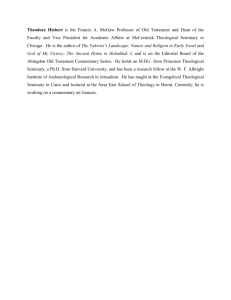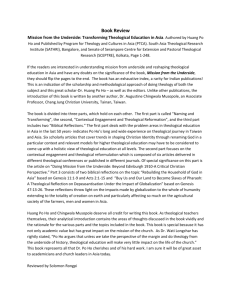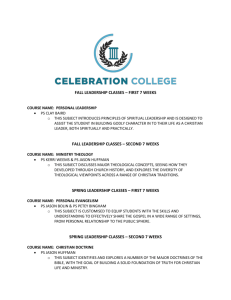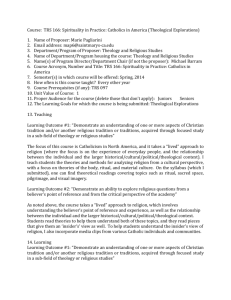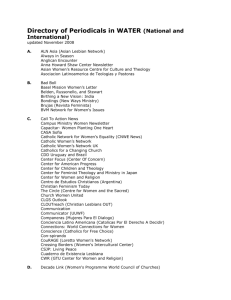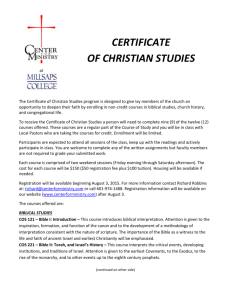T-300 Spring 2016 Brief Syllabus Version
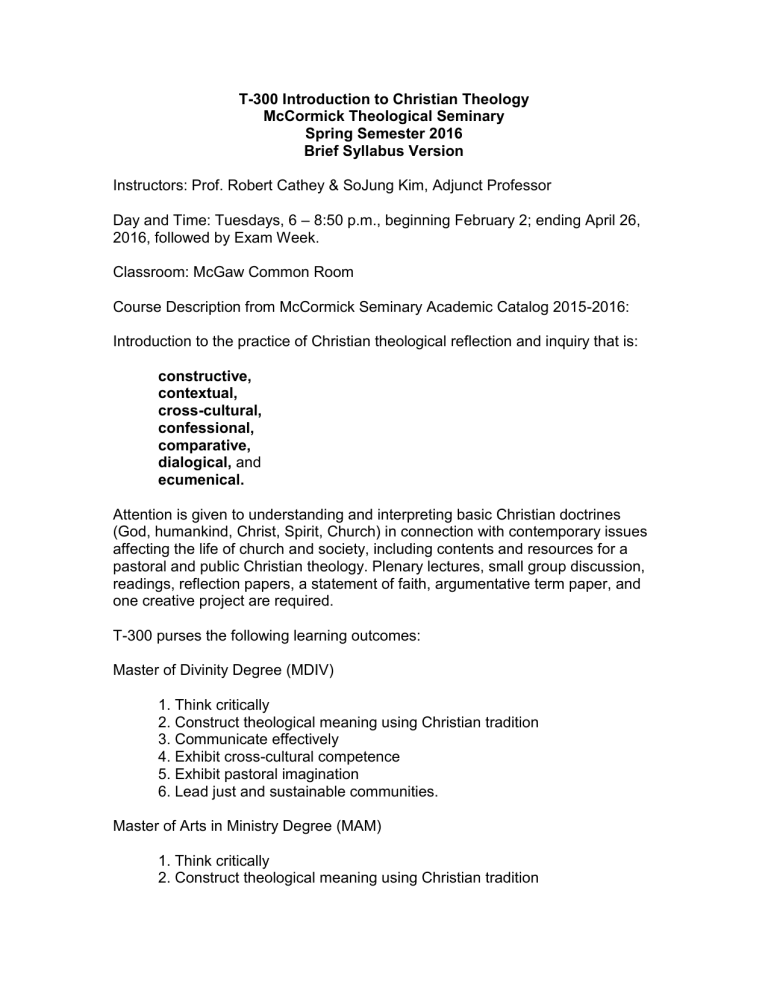
T-300 Introduction to Christian Theology
McCormick Theological Seminary
Spring Semester 2016
Brief Syllabus Version
Instructors: Prof. Robert Cathey & SoJung Kim, Adjunct Professor
Day and Time: Tuesdays, 6
– 8:50 p.m., beginning February 2; ending April 26,
2016, followed by Exam Week.
Classroom: McGaw Common Room
Course Description from McCormick Seminary Academic Catalog 2015-2016:
Introduction to the practice of Christian theological reflection and inquiry that is: constructive, contextual, cross-cultural, confessional, comparative, dialogical, and ecumenical.
Attention is given to understanding and interpreting basic Christian doctrines
(God, humankind, Christ, Spirit, Church) in connection with contemporary issues affecting the life of church and society, including contents and resources for a pastoral and public Christian theology. Plenary lectures, small group discussion, readings, reflection papers, a statement of faith, argumentative term paper, and one creative project are required.
T-300 purses the following learning outcomes:
Master of Divinity Degree (MDIV)
1. Think critically
2. Construct theological meaning using Christian tradition
3. Communicate effectively
4. Exhibit cross-cultural competence
5. Exhibit pastoral imagination
6. Lead just and sustainable communities.
Master of Arts in Ministry Degree (MAM)
1. Think critically
2. Construct theological meaning using Christian tradition
3. Communicate effectively
4. Exhibit cross-cultural competence
Masters of Theological Studies Degree (MTS)
1. Think critically
2. Construct theological meaning using Christian tradition
3. Communicate effectively
4. Exhibit cross-cultural competence
5. Engage in theological research and analysis based upon an argument and construct a theological essay or thesis article.
Specific course objectives unique to T-300 in past years have been:
This course is designed to introduce you to the practice of Christian theological inquiry and reflection focused on the understanding and interpretation of basic Christian doctrines. An overall aim for the course is to gain the ability to use theological resources critically and responsibly to articulate a constructive, coherent, and ecumenical interpretation of Christian faith pertinent to church and social contexts. Students will develop capacities to:
I.
II.
Explain and interpret central doctrines of the Christian tradition.
Define and use the basic vocabulary of theology.
III. Recognize and evaluate contexts and locations (e.g., historicalcontemporary; personal-social; local-global; race, ethnicity, culture, class, and gender) that inform theological practice and perspectives.
IV. Articulate a statement of faith that is a constructive, coherent, and ecumenical interpretation of Christian faith that is pertinent to church and social contexts and in critical conversation with your own denominational traditions and the
V.
Reformed tradition.
Engage in theological analysis, form an argument, and construct a theological essay.
VI. Think theologically and pastorally about human situations.
VII. Develop a critical awareness about religious and theological pluralism within
Christianity and beyond it while gaining a disposition to engage in ecumenical and interfaith dialogue and cooperation.
TEXTBOOKS
Gerrish, B. A. Saving and Secular Faith: An Invitation to Systematic Theology.
Minneapolis: Augsburg Fortress, 1999. (20.00)
Keller, Catherine. On the Mystery: Discerning Divinity in Process . Minneapolis,
MN: Fortress Press, 2008 (20.00).
Schreiter, Robert J. Constructing Local Theologies (Revised): 30 th Anniversary
Edition.
Maryknoll, NY: Orbis Press, 2015 (28.00).
(CONT. NEXT PAGE)
TEXTBOOKS (cont.)
Thurman, Howard. Jesus and the Disinherited . Boston, MA: Beacon Press, 1996
(15.00).
Niebuhr, H. Richard. Christ and Culture . New York: HarperCollins, 2001 ed.
(16.00).
Holcomb, Justin S. Know the Heretics . Grand Rapids, MI: Zondervan, 2014
(13.00).
Based on publishers’ lists, total cost for new paperback copies = $112.00.
Copies of all textbooks will be available for examination and purchase at
Seminary Co-Operative Bookstore, Inc., 5751 S Woodlawn Ave, Hyde Park,
Chicago, IL 60637; (773) 752-8507; texts@semcoop.com; www.coursebooks.semcoop.com
.
------------------------------------------------------------------------------------------------------------
Presbyterian Church (USA), Christian Reformed Church, and Reformed Church of America students preparing for ordination exams, and other interested students will be invited to join a reading group with the instructors to read:
Gerrish, B. A. Christian Faith: Dogmatics in Outline . Louisville, KY: Westminster
John Knox Press, 2015. (50.00)
Pedagogical Innovations for Spring 2016.
1. Pre-test / Post-test approach: before the first class session on February 2, each student will be asked to construct a brief statement of faith to be shared in a discussion forum with other students and the instructors. Each student will receive constructive feedback on her or his first draft statement. The final assignment will be to revise and reconstruct one’s statement of faith, reflecting things learned and new approaches modeled in the course. Students will be asked to compare the two drafts to explain, what changed in just one semester.
2. Each class we will break into small groups to discuss specific paragraphs from the readings for the week. After about one hour of discussion and a break, we will reconvene for instructors’ brief presentations about the passages in the context of the textbooks and the course, followed by more discussion in the large group. In traditional Jewish text study, this method is called in Hebrew Hevruta , which means to study with a partner(s). Hevruta is playful, argumentative, and builds up colleagues around the study of sacred texts and commentary as truly a form of ‘praying’ with one’s mind and spirit in community with others.
3. Theological vocabulary will be defined by glossaries constructed within Moodle by the instructors and E.A.’s to anticipate new terms and phrases as they appear in assigned readings week to week.
4. Students will have one writing assignment to share with each other and the instructors every other week that builds toward a final paper that presents one important disputed topic in theology from more than one theological perspective.
5. Discussion in small groups and large group discussion in class will be organized so that all or as many students as possible within our time limits have voice. All students will be encouraged to find and speak in their own theological voice, respecting the voices of other students in a mutually informative process.
6. Presbyterian, other Reformed students, and interested students will be invited to join a reading group that meets outside regular class hours to work our way through an important new one-volume outline of Reformed theology.
7. Students from other traditions, denominations, and movements will be invited to form their own reading groups if they so desire to focus on classic and / or contemporary texts from their respective traditions.
8. Rubrics based on our learning outcomes will be shared for all major graded assignments in the course: statement of faith (two drafts compared); bi-weekly brief papers; final paper that presents a disputed issue in theology from more than one point of view.
9. The teaching team will model multiple theological voices and perspectives to encourage students to learn from each other, engage in critical thinking, and understand how theological claims are constructed from different social locations.
10. Textbooks were selected to support the new learning outcomes of the three masters-level programs and theological diversity of our McCormick community.
